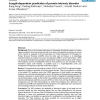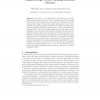294 search results - page 13 / 59 » Predicting the beta-helix fold from protein sequence data |
PRIB
2009
Springer
14 years 2 months ago
2009
Springer
For many biomedical modelling tasks a number of different types of data may influence predictions made by the model. An established approach to pursuing supervised learning with ...
BMCBI
2006
13 years 7 months ago
2006
Background: Due to the functional importance of intrinsically disordered proteins or protein regions, prediction of intrinsic protein disorder from amino acid sequence has become ...
BMCBI
2006
13 years 7 months ago
2006
Background: In the area of protein structure prediction, recently a lot of effort has gone into the development of Model Quality Assessment Programs (MQAPs). MQAPs distinguish hig...
WABI
2007
Springer
14 years 1 months ago
2007
Springer
Christopher James Langmead⋆ and Sumit Kumar Jha Department of Computer Science, Carnegie Mellon University We present a novel approach for predicting protein folding kinetics us...
BMCBI
2008
13 years 7 months ago
2008
Background: As a rule, peptides are more flexible and unstructured than proteins with their substantial stabilizing hydrophobic cores. Nevertheless, a few stably folding peptides ...


